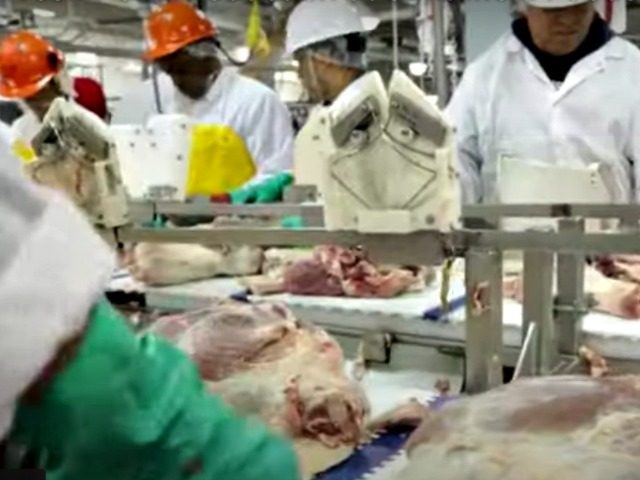President Donald Trump’s low-immigration strategy has pushed the nation’s low-wage meatpacking companies into a high-tech future, according to an article in the Wall Street Journal.
The July 9 article is titled, “Tyson Turns to Robot Butchers, Spurred by Coronavirus Outbreaks.” It quotes a variety of executives in the meatpacking industry who secretly launched large investments in robots once Trump shrank their imported supply of poor and dependent refugees. The article said:
Difficulties recruiting workers have been an impediment to expanding plants and building new ones, executives said. “The biggest push that we have in terms of automation over the last five years is because of the availability of labor in the U.S.,” said Andre Nogueira, chief executive of JBS USA, a unit of Brazilian meat company JBS SA.
Tyson has spent $500 million on technology since 2017, the newspaper said.
“Excellent,” said Jessica Vaughan, policy director at the Center for Immigration Studies. “Cheap labor policies are the Luddite policies of our era, and they are delaying the adoption of modern robots and technology.” Once deployed, the technology will help American meatpackers get higher wages, she said.
The coronavirus crash in 2020 exposed the hidden risks in the labor-intensive, low-productivity industry, she said. “Packing in a lot of workers, many of whom may not quite understand the health and safety precautions because of language barriers, is dangerous, and not good for their bottom line,” she said. “When people get sick, they had to close.”
The low-wage workforce imported by the companies killed many middle-class jobs from the early 1980s — and raised injury rates among the disposable migrant workers. Wages for slaughterhouse workers have fallen by half since 1975, including inflation, the WSJ said.
The potential of robots has already been proven in Europe’s high-wage meatpacking sites: “The technology means a single worker in plants in Sweden, Denmark and France does the work of eight or nine workers in U.S. plants, though the operations run at a slower pace,” the article said.
U.S. meatpacking lines use fewer robots and many more workers:
The WSJ also reported that meatpacking companies are hiring top-notch technology experts to raise the productivity of their labor-intensive companies:
Dean Banks spent years directing automation projects at technology and health-care companies, most recently at X, the unit of Google parent Alphabet Inc. set up to solve some of the world’s most vexing problems. He joined Tyson’s board of directors in 2017 and became president in December.
Other food-industry companies are being forced towards modernity by Trump’s low-migration policies. Costo has built a high-tech chicken plant in Nebraska, and farm companies — including strawberry growers — are developing and buying — machines to help grow and harvest crops.
The meatpacking industry’s investments are a complete validation of Trump’s 2016 promise of no amnesties, lower immigration, and higher wages. “Policymakers in Washington need to understand there is no point in pushing bills and regs to expand employers’ access to more low-skilled workers,” said Vaughan. “We don’t need a guestworker program — the companies are working it out themselves.”
The companies’ investment is also a massive repudiation of the nation’s refugee advocates who claim that meatpackers, retailers, and farming companies cannot grow without importing more workers, consumers, and renters. These groups have helped shape Joe Biden’s updated platform, which offers to welcome at least 125,000 refugees per year:
Increase the annual global refugee admissions cap to 125,000 in the first year and seek to raise it over time. Support passage of the Guaranteed Refugee Admissions Ceiling Enhancement (GRACE) Act, and commit to complying with statutory requirements to consult with Congress prior to issuing refugee determinations.
But the robots can allow the companies to process more meat and also raise wages for workers — providing there is a tight labor market, Vaughan said. “It is the robots that create well-paying jobs, not the [refugee] visas,” she said.
The U.S. investment is helping the robots become as skilled as human cutters, according to the newspaper:
At Pilgrim’s Pride Corp., PPC -1.88% the second-biggest U.S. chicken processor and majority-owned by JBS, deboning machines now trail humans by only 1% to 1.5%, in terms of meat yield per chicken. “They are much closer to what the person can do than seven years ago,” Mr. Nogueira said. Technology and automation are part of the $1 billion in capital expenditures JBS USA has planned for 2020. “One day we will be there, but we are not there yet,” he said.
The meatpackers’ new policy shows how the political elites’ support for illegal immigration has driven down wages and slashed investment in technology. It has also changed the economies of many Midwest towns that are forced to pay the civic and social costs of the low-wage workforces imported by the low-tech meatpacking companies.
The same forces operate in the white-collar economy, where American college graduates are sidelined by a huge inflow of legal and illegal foreign labor. That cheap white-collar migrant labor also reduces the need for Silicon Valley companies to invest in more productive policies and technology — despite the rush of new software and other products.

COMMENTS
Please let us know if you're having issues with commenting.